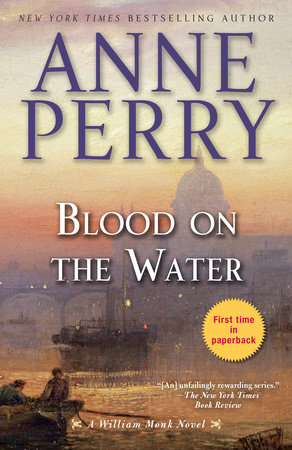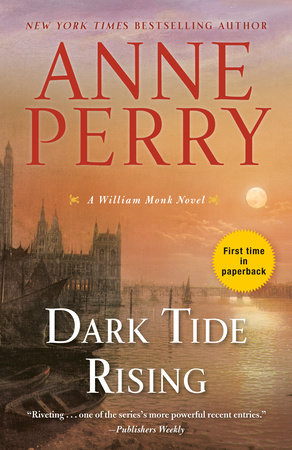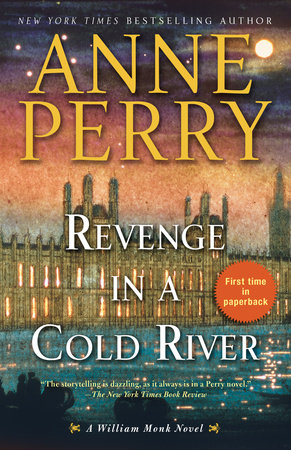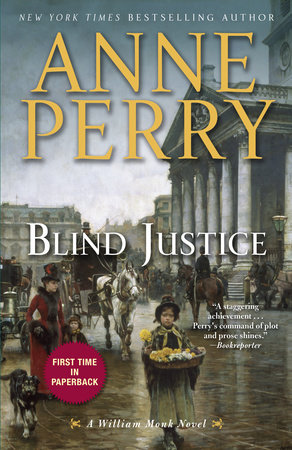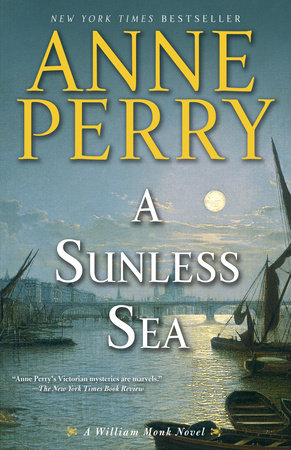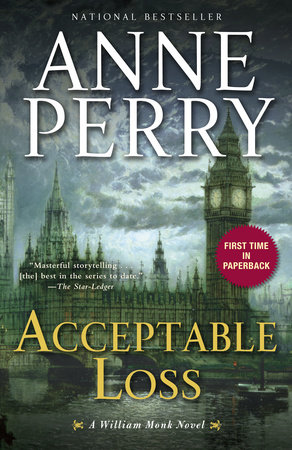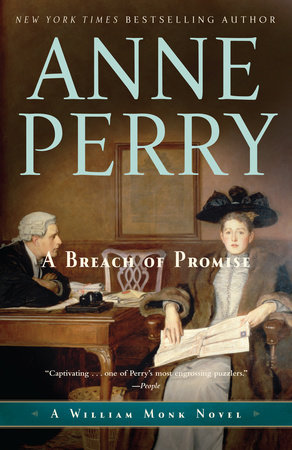Excerpt
Blood on the Water
chapter 1
Monk leaned forward, resting on his oar for a moment as he stared across the water at the Pool of London. Ships from every country on earth lay at anchor, riding lights swaying in the dusk wind. The sun was low in the early summer sky and streaks of red flared across the west.
Behind him, at the other oar, Orme rested also. He was a quiet man who had worked on the river all his life.
“Good sight, eh, sir?” he said, his wind-burned face creased in satisfaction. “I reckon there ain’t none like it in the world.”
Monk smiled. For Orme that was an emotional—and lengthy—speech. “I think you’re right,” he agreed.
In unison they bent to their oars again. There was a pleasure boat a hundred yards or so in front of them, and they could hear the music and the laughter echoing from the lantern-strung decks, even from this distance. The boat had probably been out most of the day, perhaps as far as Gravesend on the estuary. It was perfect weather for it.
Some young men were playing around, mock fighting—too close to the rail, Monk thought. They ought to be more careful. The Thames current was deceptively swift, and the water filthy.
A few other small boats dotted the water close by, one within yards of the pleasure boat.
Monk frowned as a man on the deck shouted loudly and waved his arms, running towards the railing as if he would jump over it.
Then suddenly there was a shattering roar and a great gout of flame leaped from the bow. Debris shot high into the air and the column of light seared Monk’s eyes. Instinctively he ducked as the shock wave struck, and pieces of wood and metal pelted into the water around him and Orme with deafening splashes. As one, they grasped the oars and fought to steady the boat in the turbulence that washed out from the stricken vessel.
There seemed to be bodies everywhere, people thrashing in the water, shouting above the din.
Monk was speechless, his chest almost too tight to draw breath. Without a word, he and Orme dug the oars in deep to race into the nightmare, shoulders bent, muscles straining, oblivious of everything but the horror.
Even as they rowed, the gaping hole in what was left of the bow was swallowed in water; and, huge paddles still turning, the boat plunged beneath the surface.
Within minutes they reached the first body: a man floating face up, eyes wide and sightless. They tried to lift him before realizing that both his legs were gone, bloody stumps half obscured in the filth of the river. He was beyond their help. Monk’s stomach clenched as he let the corpse fall back into the water.
The second victim they found was a woman, her huge skirts already sodden and dragging her down. It took all Monk’s strength to heave her aboard and Orme’s very considerable skill to keep the boat steady. She was barely conscious, but there were too many others sinking fast to take the time to revive her. All they could do was put her as gently as possible face downward so the water she spewed did not drown her.
They worked in perfect synchronization, bending, lifting, keeping the boat from capsizing as it swung and tipped with their movement, and the clutching of desperate hands as white faces upturned in the gloom. It seemed few in the water could swim, and those who could were losing strength fast. Monk reached for one swimmer and felt fingers like iron digging into his flesh as he heaved him aboard.
He and Orme were both soaked to the skin, muscles aching, arms bruised. Monk’s heart beat in his throat as if it would choke him. He could not do enough, not nearly enough.
It was only minutes after the explosion when the last of the boat slid into the dark river and disappeared. There was nothing left but the cries, the debris, and the bodies—some motionless, some still fighting to stay above the water.
Other boats were coming. A ferry was less than forty feet away. As it swung around and the men reached over to pull people from the water, the fading sunlight momentarily illuminated a picture and a name painted on the stern. A barge was making its way slowly, dragged against the current as it came closer. The bargee was bending and reaching out to help those closest to him. A small coal freighter was flinging barrels and scrap wood overboard; anything that anyone in the water could clutch on to to help them float before their imprisoning clothes dragged them, still screaming, under.
Monk and Orme had heaved six exhausted people out of the water, but that was all they dared carry. Sick with misery, they had to beat off others whose weight would have sunk the boat. Monk had to forcibly push one man away from the gunwales with the blade of his oar, afraid that he would overturn the boat in his frantic attempt to climb aboard.
They pulled for the shore, hearing the repeated thanks of the survivors who were huddled together, trying to assist one another in the body of the boat, holding up those barely conscious. Men on the banks were wading as far as they could, roped together, stretching out to lift and help.
Monk and Orme went back out again into the near darkness, directed now as much by cries as by sight. They pulled several more people out of the water, and rowed them ashore.
Monk lost all track of time. He was wet to the skin and so cold he was shaking, yet he and Orme could not give up. If there was even one person still alive in that black water, then they must find him or her.
It seemed every man in the River Police was here with them, and all manner of others joined in, united in their horror and grief. The banks were lined with people offering aid. Some pushed mugs of hot tea and whisky into freezing hands, helping the rescued to hold on and drink. Others had blankets; some even had their own spare, dry clothes.
The moon was high in the sky when Monk and Orme finally moored the boat and climbed wearily up the steps from the river to the level dockside, acknowledging in a glance that they had done all they could. The wind had risen and scythed across the open stretch in front of the Wapping Police Station, which was their headquarters.
Monk hunched into his coat instinctively but it was pointless when everything he wore was soaking wet. He increased his pace. Weary as he was, the cold was worse. He could hardly feel his feet and all his bones ached. The palms of his hands were blistered so he could barely move them.
He reached the door with Orme a step behind him. Inside, the woodstove was lit. The air was blessedly warm.
Sergeant Jackson came bustling toward them immediately, attending to Monk first, as rank demanded.
“You’d better get them clothes off, sir. We got plenty o’ dry ones in the cupboard. Not your taste, sir, bein’ a bit of a dandy like you are. But dry’s all that matters now, or you’ll catch your death. Beggin’ yer pardon, sir, but you look like hell!”
Monk was shaking so hard his teeth were chattering and it was beyond his control to stop. “I thought hell was supposed to be hot!” he said with an attempt at a smile.
“No, sir, cold an’ wet. Ask any seaman, ’e’ll tell you,” Jackson replied. He turned to Orme. “You too, Mr. Orme. You don’t look no better. When you come out I’ll ’ave an ’ot mug o’ tea for yer wi’ a good dash o’ whisky in it.”
“A very good dash, if you please,” Monk added. He wanted the fire of it to take the edge off the horror inside him, the pity and guilt he felt for those he had not saved. He sat down and let the warmth of the fire wrap around him like a blanket, for a moment obliterating everything else.
Jackson did not say anything, but bustled about preparing the tea. He had spent all his life on the river, like Orme. He had seen other tragedies before, but nothing like this. He had been there all evening organizing men and boats, and answering desperate questions as well as he could.
Twenty minutes later, skin toweled hard enough to hurt, in clean, dry clothes, but still conscious of the stench of the river on his skin and in his hair, Monk sat near the stove and sipped his tea. It was piping hot, and at least half whisky. Orme was in the chair beside him, and Jackson was fussing over the next men to come in.
“That explosion,” Orme said grimly, pulling a face as the tea burned his mouth, “couldn’t have been the boiler. The explosion came from the bow, nowhere near the engines. So what the devil was it?”
“Can’t see any other way it could’ve been an accident,” Monk said. “That only leaves sabotage.”
Orme scowled. “Why, sir? What kind of a madman would blow up a pleasure boat? It doesn’t make any sense.”
Monk thought about it for several moments. He was exhausted. Few ideas made sense. Why would anyone intentionally sink a pleasure boat? There was no cargo to steal or destroy, only people to kill. Was it an enmity against the owners of the boat? A business rivalry or vendetta? Or perhaps a grudge against some guests on the boat? Was it political? Or even an act of war by some insane foreign power or a group of anarchists?
“I don’t know yet. Perhaps someone who hates Britain,” Monk said finally. “There are a few of those.” He finished the last of his tea and stood up, stumbling a little but quickly regaining his balance.
The door swung open and Hooper came in. He was a tall, loose-limbed man and was shedding water with every step. His face was haggard with grief. He didn’t say a word, but folded himself up into one of the chairs as Jackson stood up to fetch him tea.
“We’d better go and speak to the survivors,” Monk said quietly to Orme. “Somebody must have seen something. Big question is—did whoever did it escape, or did they intend to go down with the boat?” He put his hand on Hooper’s shoulder for a moment. Words between them were unnecessary.
Orme set his mug down. “God help us, we really are talking about madness, aren’t we?”
Monk did not bother to answer. He walked out into the night, his face cold again after the warmth of the room. In the clear sky moonlight spread a silver path across the river and the dark debris floating on its surface. He shivered at the thought that the boats still out there were only picking up bodies now, although most of the dead would be trapped in the wreck, settling into mud on the riverbed.
As he moved across the open space toward the dockside he thought of what he must do, and dreaded it. But it was inescapably his job. He was Commander of the Thames River Police. Any crime on the river was his responsibility, and this was the worst incident in living memory. There must have been the best part of two hundred people on the boat. The bereaved would be numerous. At the moment the whole tragedy seemed chaotic, senseless. Where could he begin?
Coleman, one of his own men, approached him in the dark. Monk could hardly see his face, but his voice when he spoke was rough-edged, only just in control.
“Looks like we saved about fifty, sir. Got most of them here on the north bank.” He coughed, his throat tight. “Put ’em anywhere we can. You could start with that warehouse over there, Stillman’s. A lot of survivors there and they’re making room for more, if there are any. All sorts ’ave come with blankets, clothes, tea, whisky, anything that can help.” He coughed again. “Got half a dozen sent to hospital, too, but I can’t see how they’ll make it. That water’s like to poison you even if you don’t drown in it.”
“Thank you, Coleman.” Monk nodded and walked on. The warehouse was close. He needed to put his emotions aside and concentrate on the questions he had to ask and the answers he needed to know to begin to make sense of this.
He picked his way between the boxes, kegs, and bales outside in the warehouse yard. He went up the step to the cracks of light he could see around the door.
Inside, the warehouse was lit by bull’s-eye lanterns, and there were a dozen or so people lying on the floor wrapped in blankets. Several women were ministering to them with hot drinks and towels, in some cases rubbing their arms and legs, all the time talking to them gently. Only a few glanced up at Monk’s entry. He did not look like a policeman; he was exhausted, unshaven, and dressed in ill-fitting waterman’s clothes.
“My name is Monk,” he introduced himself to a woman carrying towels and bandages. “River Police. We need to find out what happened. Which of these people can I speak to?” he asked.
“Does it have to be now?” the woman said sharply. Her face was gray with fatigue, eyes red-rimmed. There were stains of dirt and blood down the front of her dress.
“Yes,” he said quietly. “Before they forget.”
Another, older, woman rose to her feet from where she had been helping a man sip a hot drink. She was strongly built, her clothes so worn they were faded in patches where the pattern had been rubbed off the cloth. In the yellow light of the lantern her face suggested not only weariness but disgust.
“It’s unlikely they’ll forget!” she said between her teeth. “They will probably relive it the rest of their lives!”
“None of us will forget the horror,” Monk answered her quietly. “But it wasn’t an accident. I need to know who did this, and for that I need details only they can provide.”
“Find whoever built the damn boat!” she retorted bitterly, turning away from him and towards a man cradling a broken arm.
Monk put his hand on her arm, holding her firmly. He felt her tense and then pull against him. “It was an explosion,” he said between his teeth. “The whole bow blew out; there was a hole in it you could drive a coach and four through.”
She turned back to him, her eyes wide. “Who told you that?”


